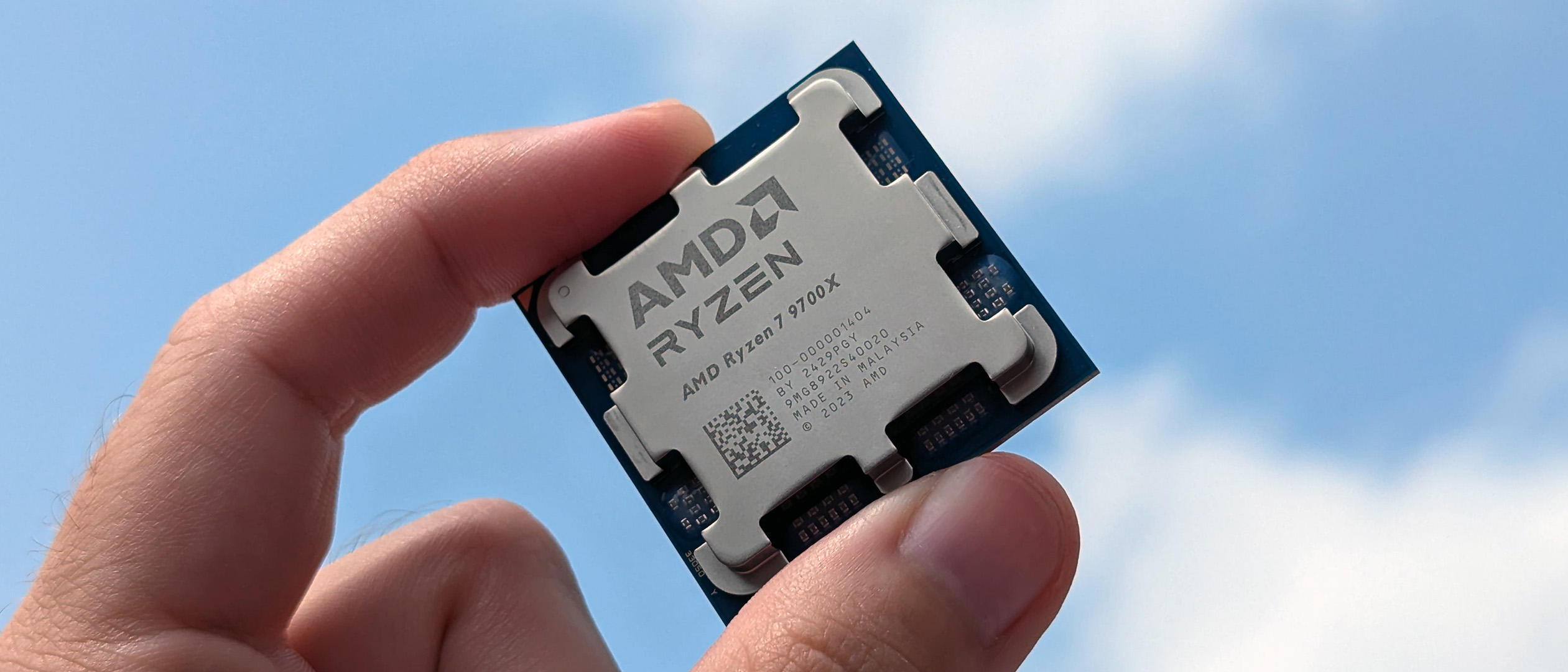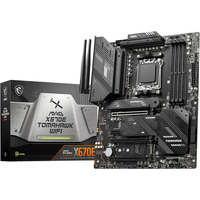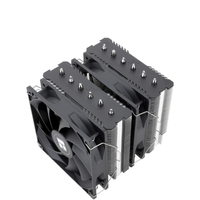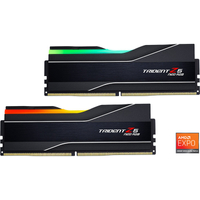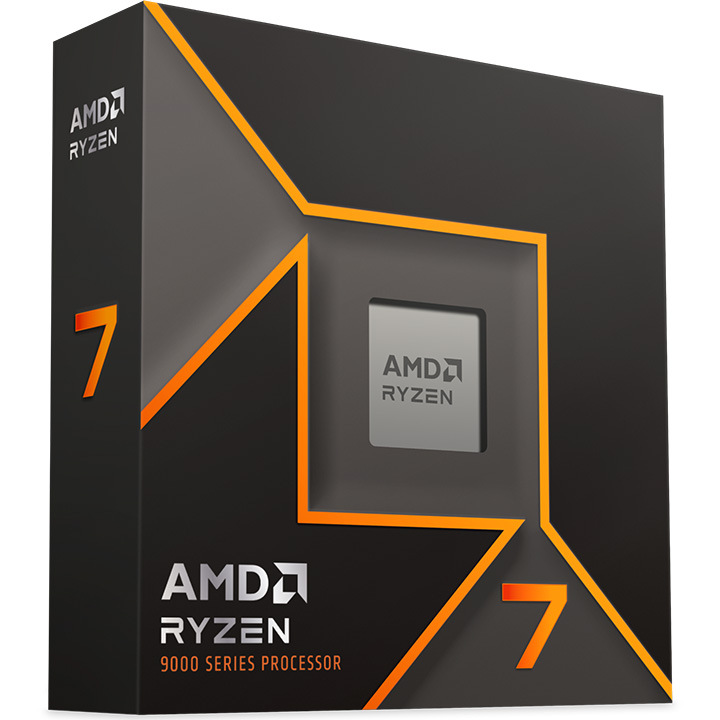Windows Central Verdict
AMD is delivering a multi-punch knockout with the Ryzen 7 9700X, as it drops the MSRP from its previous-generation 7700X and even returns to the 65W power draw of its 5700X. It comes with caveats, and the generational multi-core improvements are barely worth mentioning. However, its single-core performance is a thing to behold, ranking above most of Intel's comparable chips at 125W. Plus, it matches AMD's own gaming CPU champion, the Ryzen 7 7800X3D, while remaining cheaper and more power efficient — it's the new mid-range champion.
Pros
- +
$40 cheaper than last-gen Ryzen 7 7700X at MSRP
- +
Back to 65W TDP for more efficient, cooler processing
- +
Better or matching single-core performance of Intel's 125W chips
- +
Matches AMD's reigning gaming CPU champion, the Ryzen 7 7800X3D
Cons
- -
Minor multi-core performance bump over previous gen
- -
Outperformed by Intel 13th Gen Core i5 chips in multi-core tests
- -
No stock CPU cooler included
Why you can trust Windows Central
I've recommended AMD's Ryzen 5 5600X and, after an eventual price drop, the Ryzen 7 5800X for years since their release, with the latter installed in my gaming rig.
AMD always has the edge on affordability with desktop processors, but it often lags behind Intel on some performance metrics. Whether that matters to you would vary depending on a few value-centric factors.
However, despite dropping the power draw and price tag, the all-new AMD Ryzen 7 9700X has made some incredible performance breakthroughs in single-core benchmarks and even beats out my previous recommendation of the best gaming CPU on the market. Here's how it performed in my testing and where it ranks against its top rivals.
Disclaimer
This review was made possible by a review sample provided by AMD. The company did not see the contents of the review before publishing. Some extra benchmark results (mainly for Intel Core CPUs) come from public databases and third-party sources, including CPU Monkey.
Ryzen 7 9700X: Price, availability, and specs
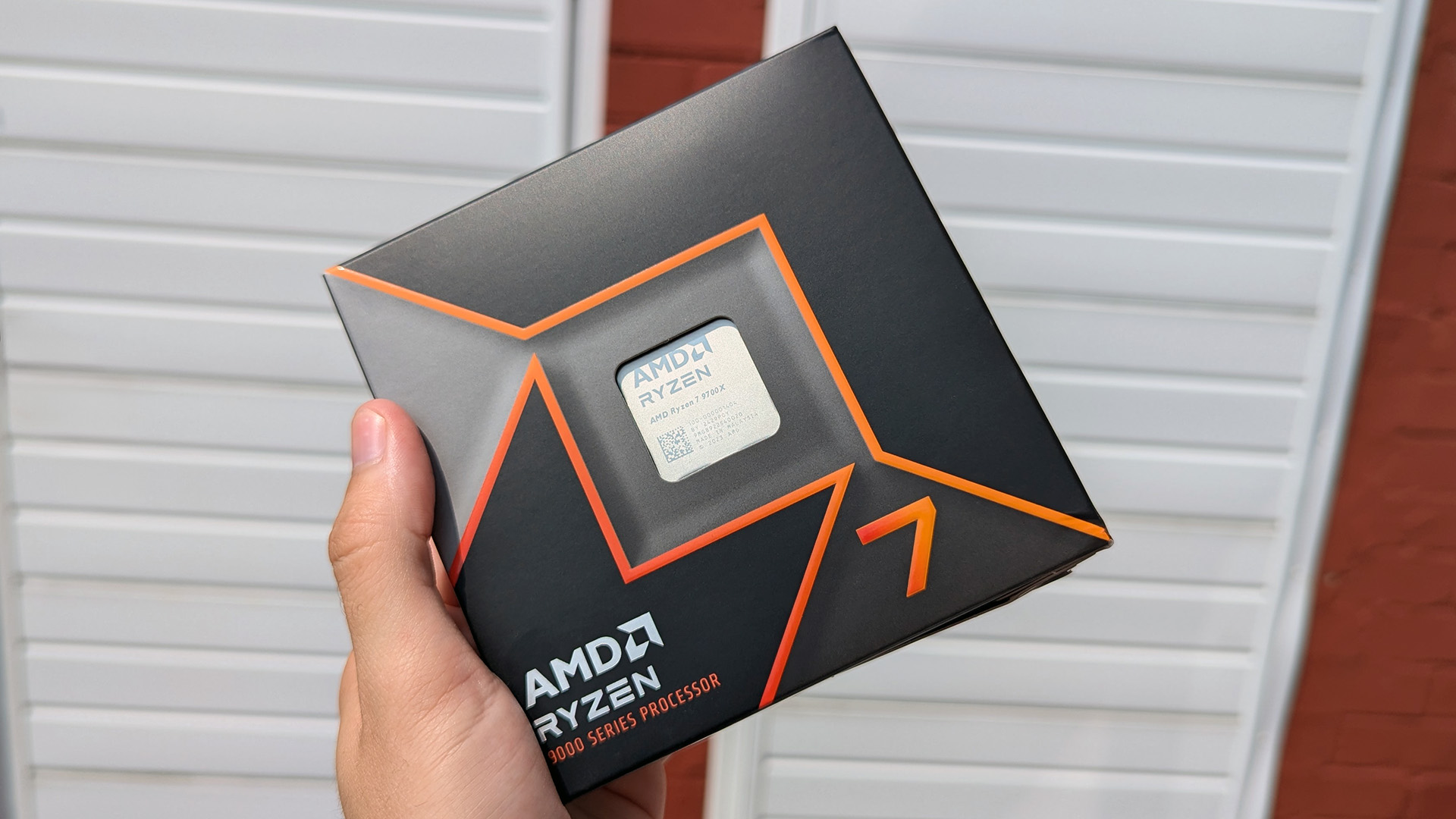
Price: $359 at Newegg
Release: August 8, 2024
Cores/threads: 8c 16t
Base clock: 3.8GHz
Max boost: 5.5GHz
L3 cache: 32MB
TDP: 65W
AMD will sell the Ryzen 7 9700X through mainstream third-party storefronts, like Best Buy and Newegg, for a $359 MSRP from Thursday, August 8, 2024. It's an impressive increase in performance-per-dollar value, with about a 10% discount from the previous-gen Ryzen 7 7700X price tag.
The 9700X's base TDP has also significantly dropped to 65W, down from 105W on the 7700X and returning to match its older equivalents. The max turbo clock continues to creep up with each new Ryzen -700X chip, but the core/thread count remains steady alongside the L3 cache. Improvements delivered through AMD's Zen 5 architecture will be the key to how much performance has improved this year.
| CPU | Cores / Threads | Max clock | L3 | Base TDP | MSRP |
|---|---|---|---|---|---|
| AMD Ryzen 7 9700X | 8/16 | 5.5 GHz | 32 MB | 65 W | $359 |
| AMD Ryzen 7 7700X | 8/16 | 5.4 GHz | 32 MB | 105 W | $399 |
| AMD Ryzen 7 5700X | 8/16 | 4.6 GHz | 32 MB | 65 W | $299 |
| AMD Ryzen 7 3700X | 8/16 | 4.4 GHz | 32 MB | 65 W | $329 |
Unlike the Ryzen 8000G Series, the Ryzen 9000 chips don't include AMD's XDNA 2 NPU (Neural Processing Unit) for any dedicated AI processing. However, the CPU chiplet still processes AI workloads with an 'enhanced' Advanced Vector Extensions 512 (AVX-512) datapath. AMD recently launched the Ryzen AI 300 Series mobile chips, focusing on generative AI with laptops instead.
A dual-core integrated Radeon graphics chiplet is included in the Ryzen 7 9700X, clocked at 2.2GHz, supporting video output for those without a dedicated graphics card. Expansion depends on your motherboard choice, though PCIe 5.0 support for modern GPUs and mandatory DDR5 RAM are standard.
Recommended hardware
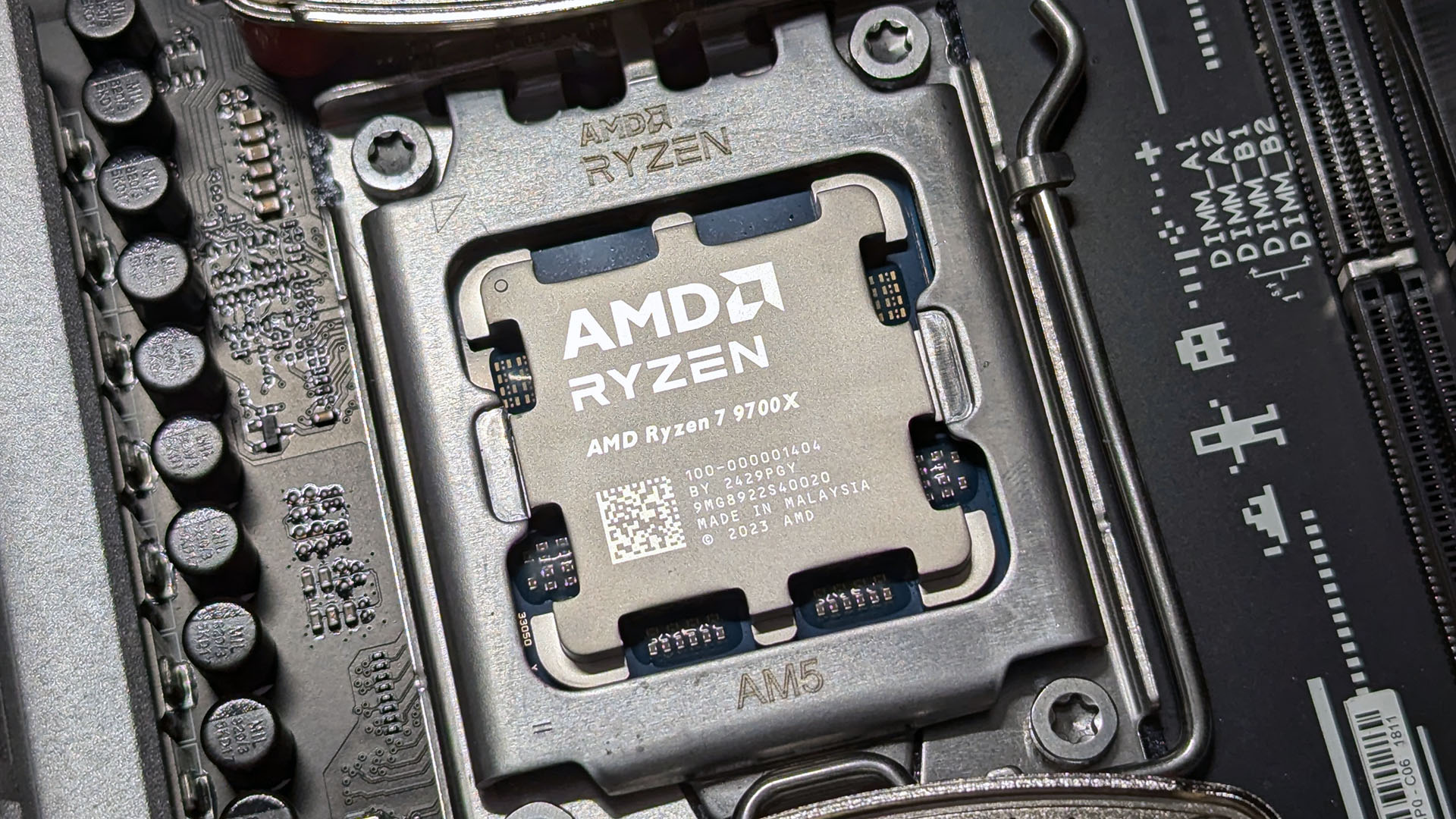
AMD recommends a traditional air cooler for the Ryzen 7 9700X and the upcoming 800 Series of AM5 motherboards, including X870 and X870E chipsets. While 870 Series motherboards will be able to push overclocked DDR5 memory speeds to 8000MT/s and beyond, AMD previously provided a sample of G.SKILL Trident Z5 Neo RGB DDR5-6400 RAM and still encourages an AUTO:1:1 DDR5-6000 EXPO profile where possible to stay in the performance "sweet spot."
MSI MAG X670E Tomahawk Wi-Fi
PCIe Gen 5 support for expansion cards and lightning-fast M.2 solid-state drives alongside onboard Wi-Fi 6E.
Buy: $249 at Amazon | $259.99 at Newegg
Thermalright Peerless Assassin 120 SE
Standing at 155mm with dual 120mm PWM fans included, the SE supports AM4 and AM5 sockets.
Buy: $36.90 at Amazon | $39.99 at Newegg
G.SKILL Trident Z5 Neo RGB 32GB DDR5-6000
Pre-loaded with AMD EXPO memory overclocking profiles and a sleek strip of RGB lighting for aesthetics.
Ryzen 7 9700X: Multi core performance
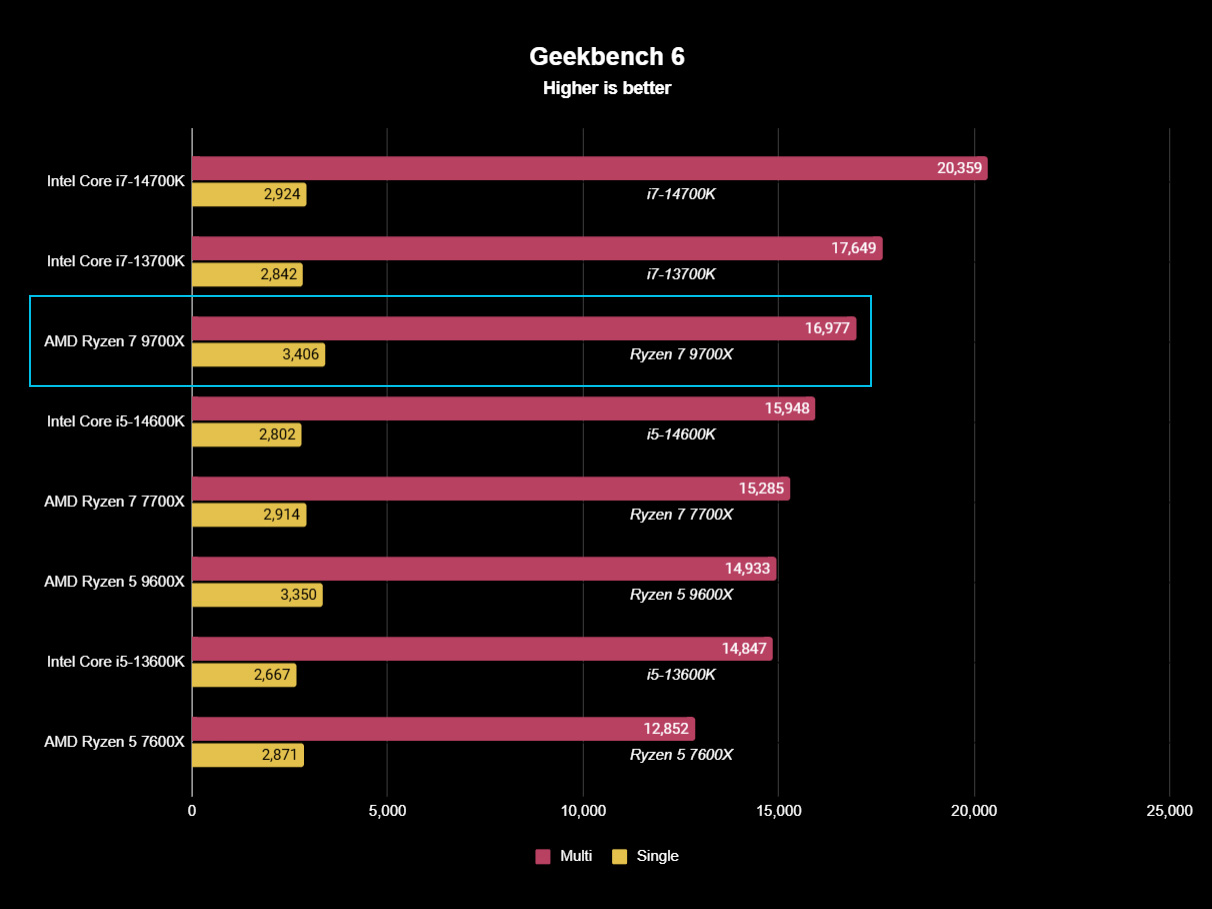
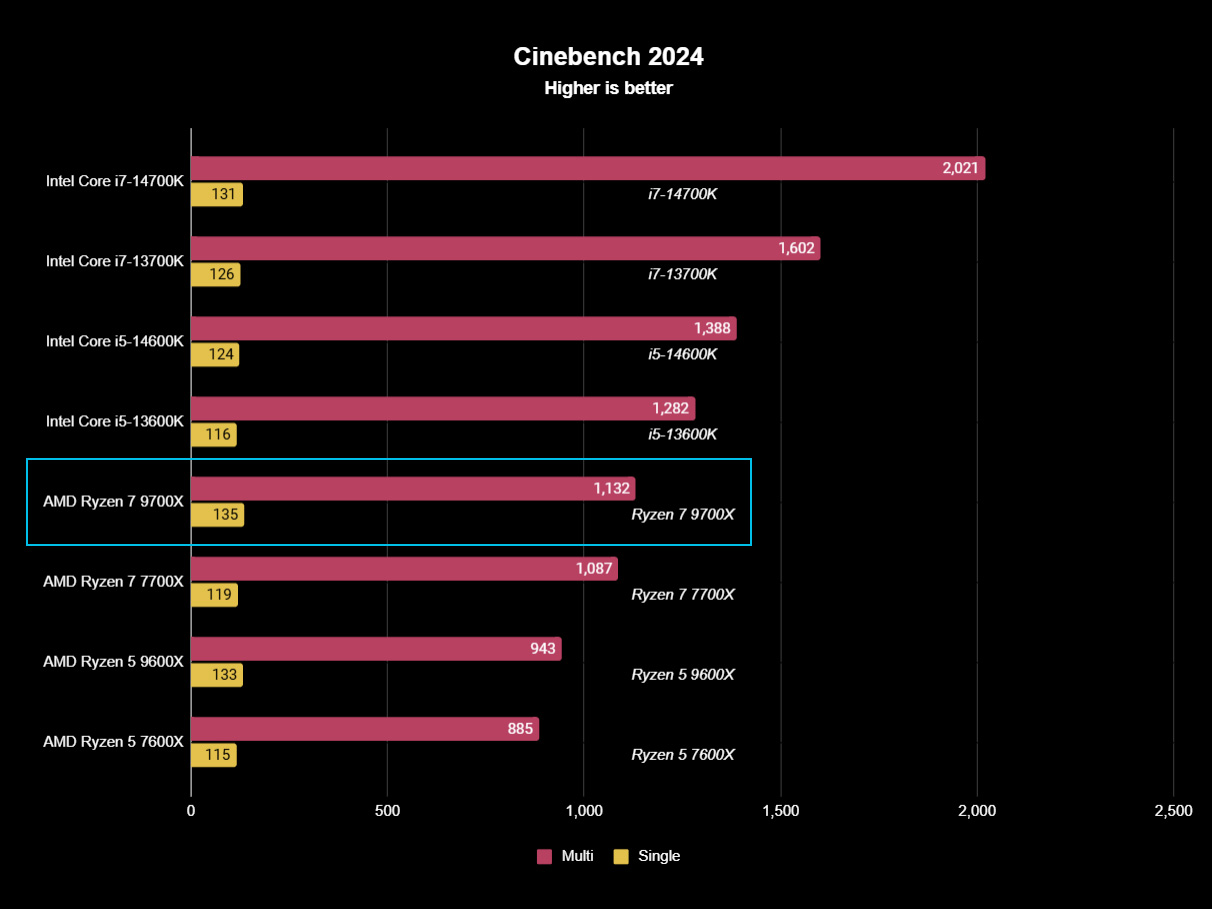
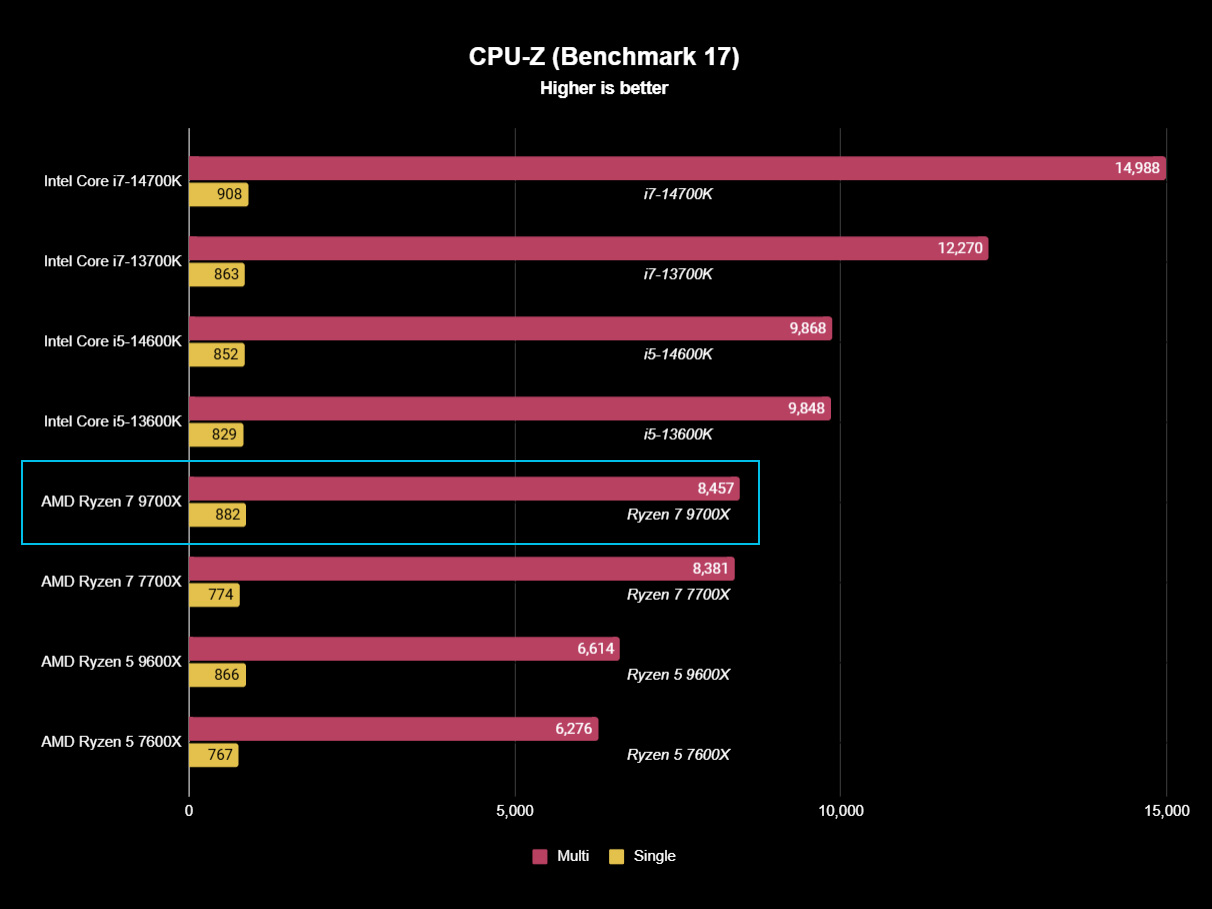
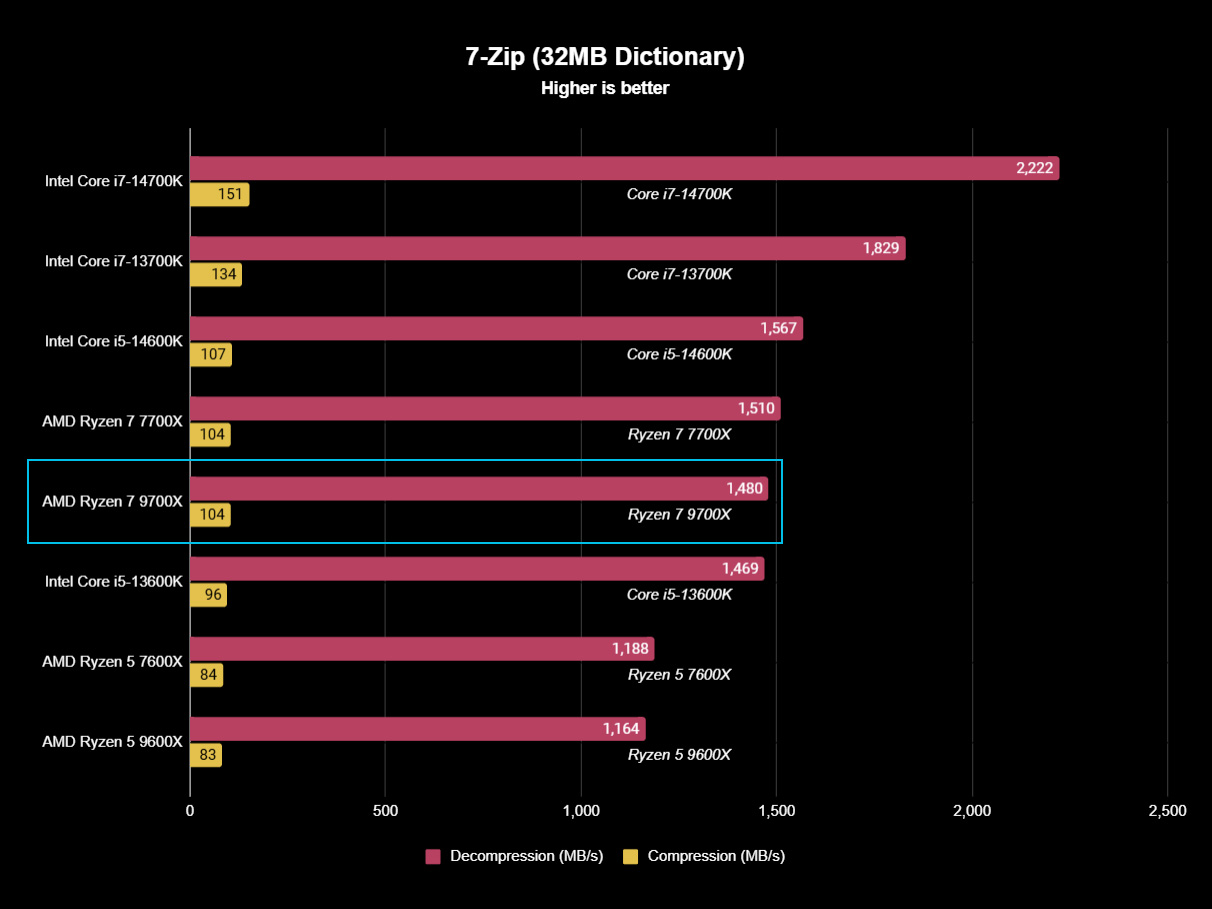
Depending on how you arrange the performance benchmark results, ranking AMD's octa-core Ryzen 7 9700X splits into two directions. For multi-core performance, this 65W processor is either outshone by four of Intel's 125W offerings over two modern generations in extended stress tests with Cinebench 2024: the 13th Gen Core i5-13600K and Core i7-13700K, plus the 14th Gen Core i5-14600K and Core i7-14700K, or it creeps slightly ahead with burst CPU performance tests in Geekbench 6.
While not as significant as the jump from the 5700X to 7700X, the Ryzen 7 9700X still delivers a generational multi-core performance bump despite dropping its base TDP by 40W.
The previous-generation Ryzen 7 7700X pulls ahead in one multi-core benchmark, compressing and decompressing synthetic 7-Zip archives. It also came close in the CPU-Z benchmark test but never outperformed the Ryzen 7 9700X in single-core performance. Intel's 14th Gen i7-14700K multi-core results are leagues ahead with twice the wattage and the explicit increase to 20 cores and 28 threads over the 8c/16t count on the Ryzen 7 9700X, as well as a $50 increase on its MSRP.
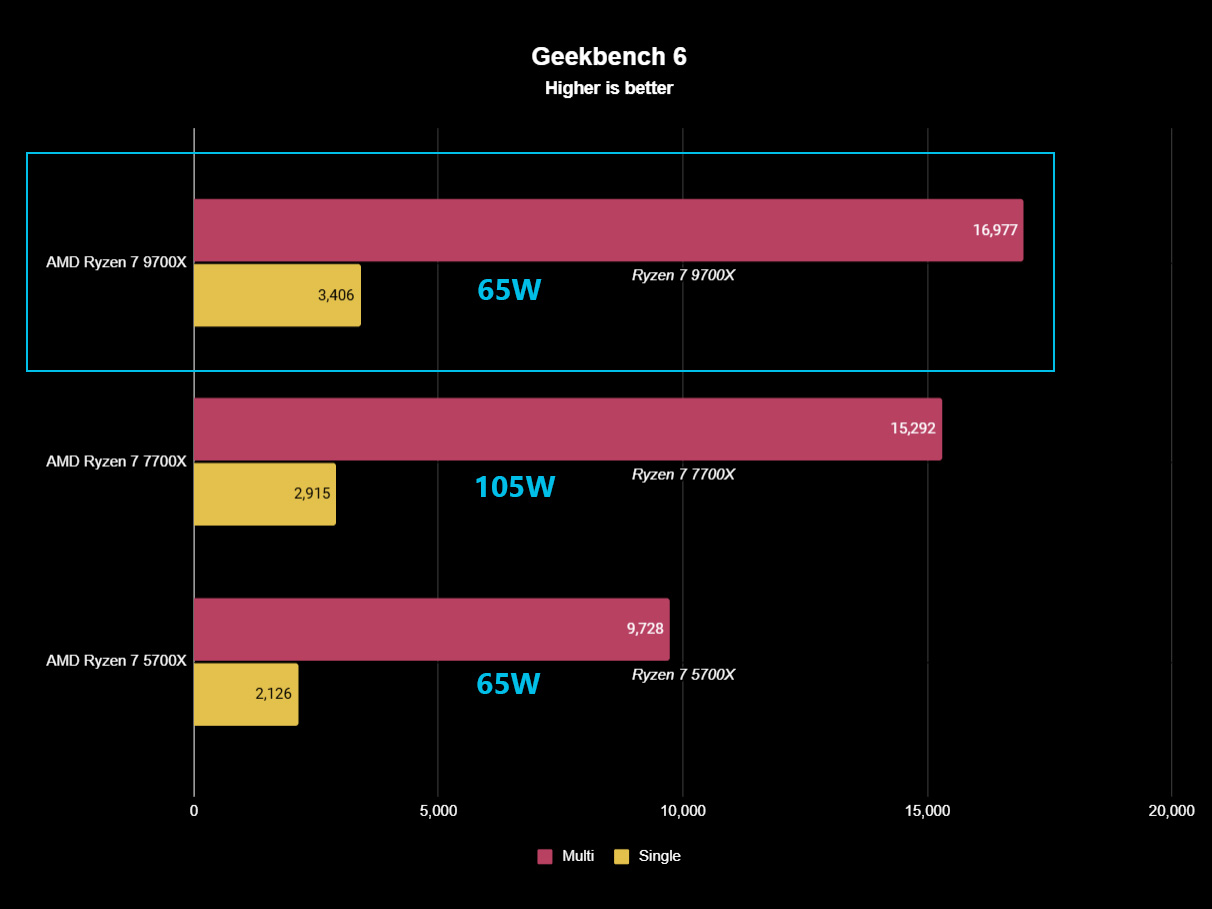
AMD's efforts to achieve this multi-core performance at half the power of Intel's competing chips shouldn't be understated. A 40W base TDP drop from the previous-gen 105W Ryzen 7 7700X hasn't stopped the Ryzen 7 9700X from delivering a decent generational performance uplift, though it's certainly far from the significant leap AMD made from the 65W 5700X. Still, it's an impressive metric as AMD moves from Zen 4's 5nm manufacturing process to TSMC's 4nm and is part of an overall showcase in performance-per-watt improvements for the Ryzen 9000 Series.
These benchmarks reflect the Ryzen 7 9700X's 3.8GHz base frequency, another drop from the 105W Ryzen 7 7700X, which starts at 4.5GHz. Overclocking enthusiasts shouldn't worry, though, as the 9700X still boosts as high as 5.5GHz, slightly faster than the 7700X's 5.4GHz, despite the lower base power and maximum socket limits. Essentially, AMD can offer at least a minor bump to multi-core performance with the same 65W power draw that it used to, as it sticks with the AM5 socket until 2027 for potential upgrades to the top-end Ryzen 9 9950X following price drops.
Is the AMD Ryzen 7 9700X good for gaming?
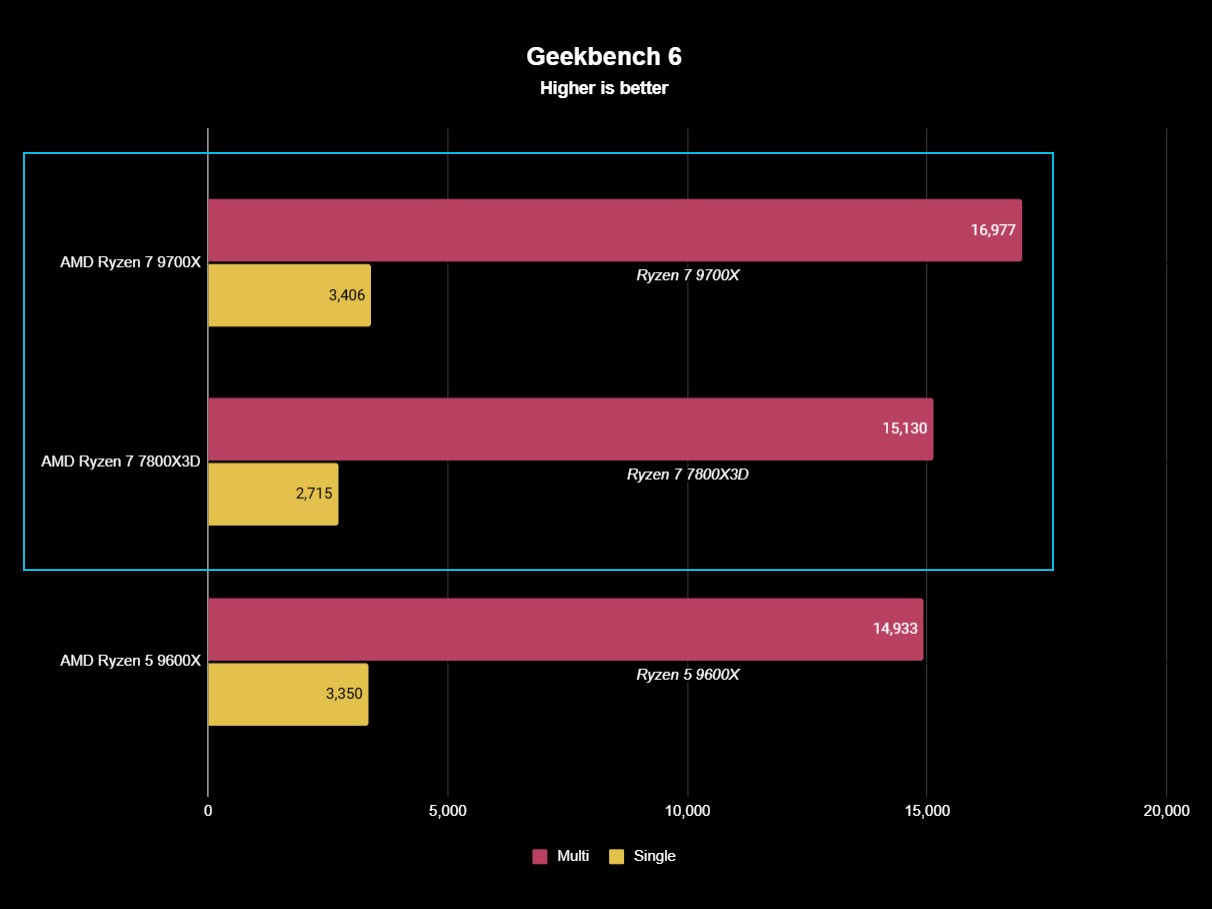
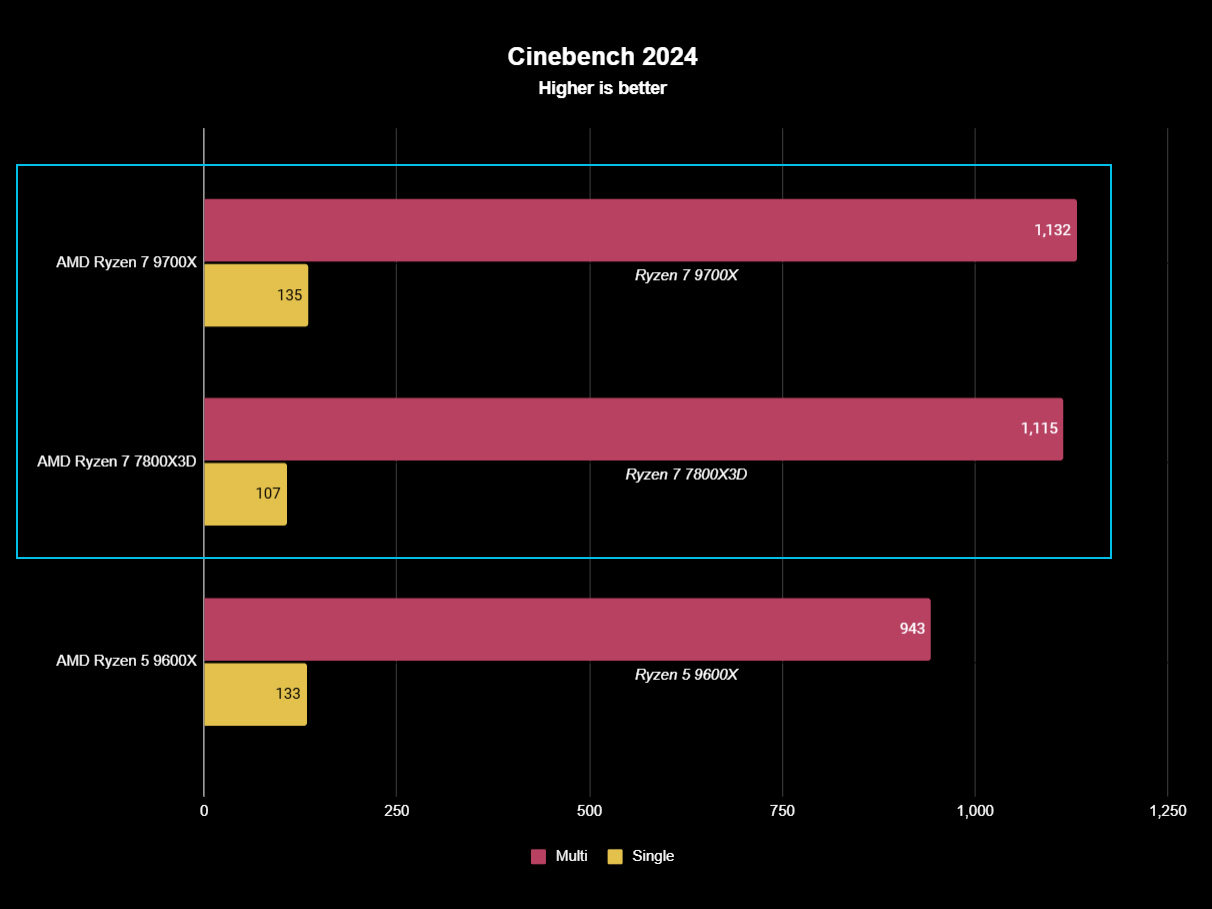
Yes, absolutely. While it doesn't include AMD's 3D V-Cache aimed at gamers, the Ryzen 7 9700X still matches the previous-gen Ryzen 7 7800X3D, a powerhouse processor that has been all too easy to recommend as the best gaming CPU since its release. However, that shouldn't signal to gaming enthusiasts who adopted the Zen 4 -X3D chip that it's already time to upgrade. The performance improvements are marginal, so this serves as more of a temptation to those looking to upgrade from a Ryzen 5000 Series chip.
I still recommend the Ryzen 5 5600X to anyone building a budget gaming PC, and I run the Ryzen 7 5800X in my gaming desktop since it eventually dropped from its high MSRP. However, while it would mean a total motherboard upgrade from my AM4 range to a new AM5 equivalent compatible with the Ryzen 7 9700X, I can heartily recommend it as a perfect modern in-between for anyone in a similar situation as mine.
Ryzen 7 9700X: Single core performance
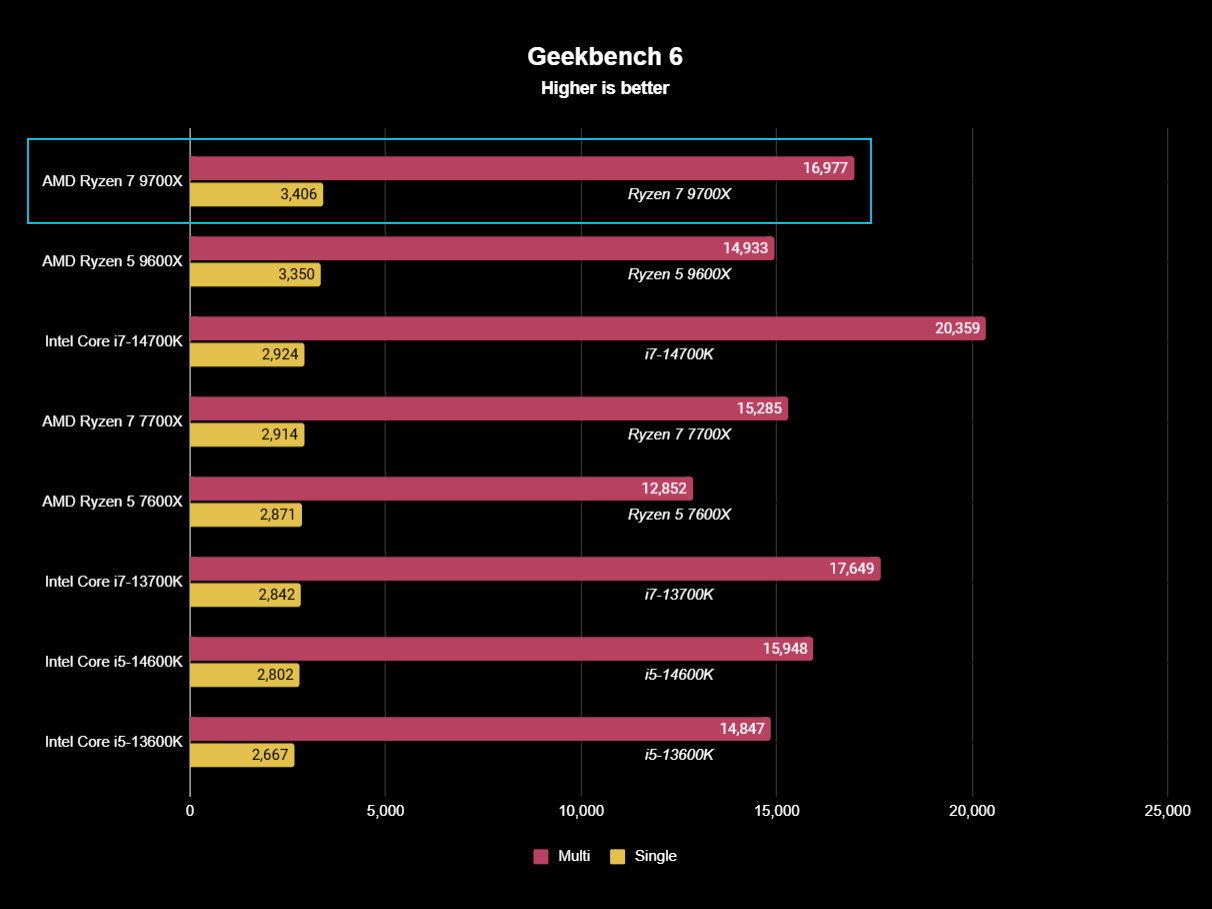
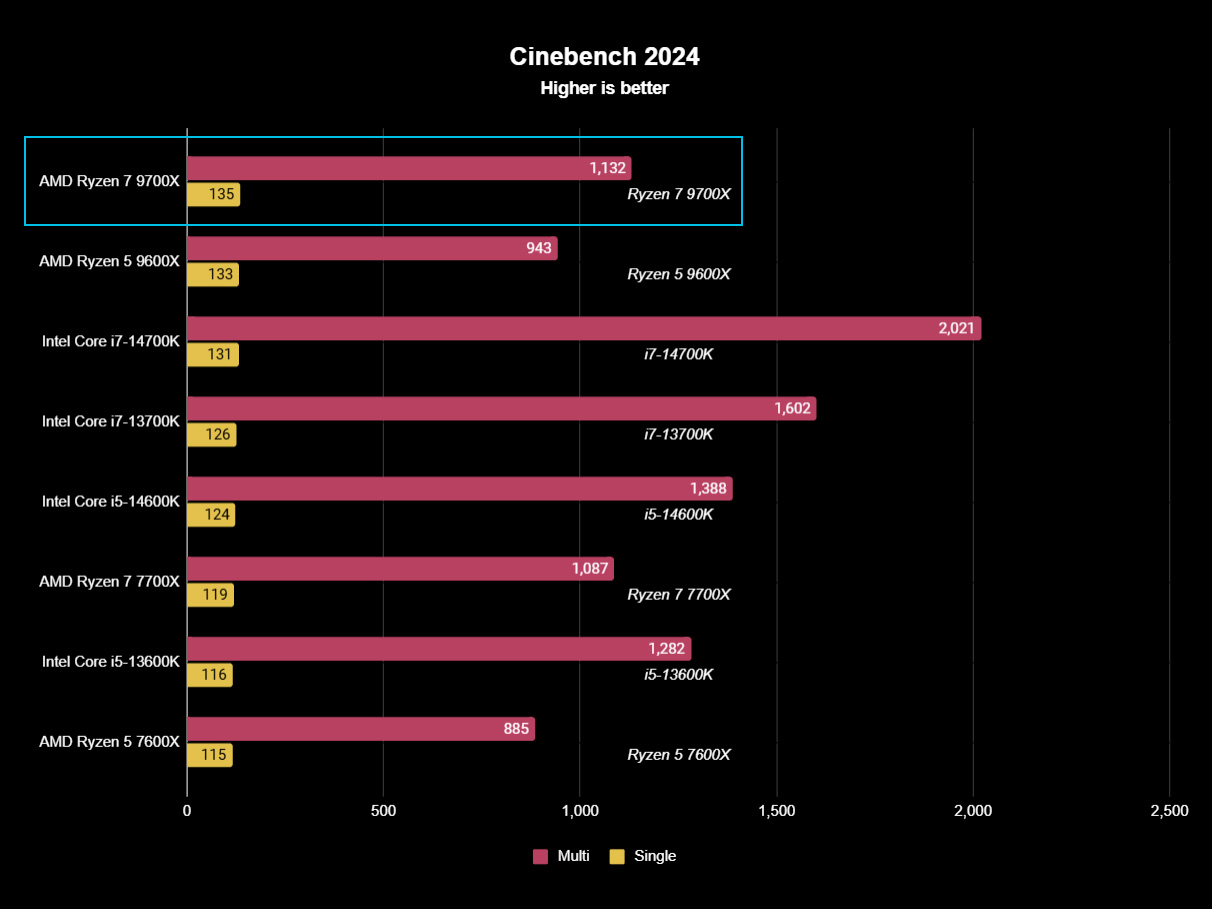
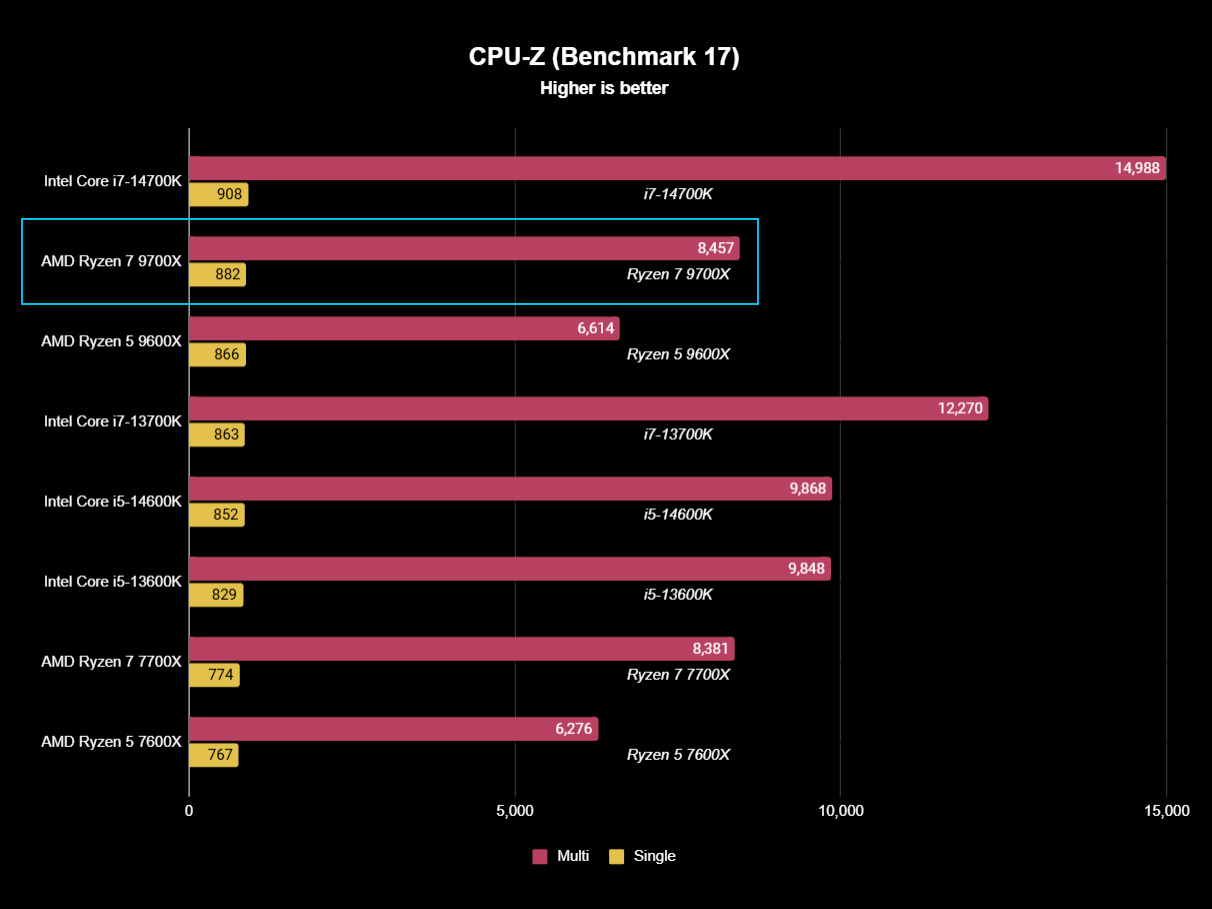
AMD mostly annihilates its competition in single-core performance, as the Ryzen 7 9700X shoots to the top of the pile with some of the best scores we've seen to date, save only for a CPU-Z result against Intel's 14th Gen i7-14700K. Given the lower physical core count of 8 on the 9700X compared to 20 on the 14700K, it's logical that each core can receive a higher share of wattage and offer stronger performance.
AMD wrestles the single-core crown away from Intel as the Ryzen 7 9700X challenges the 14th Gen i7-14700K in most CPU benchmarks.
If all cores were theoretically handling separate tasks equally, AMD would have the edge with a few more watts per core. It's another metric that will appeal to gamers, as single-core performance is usually a priority for many titles, though modern game engines can scale to multi-threaded options more effectively. Still, this bump to single-core performance is phenomenal, especially considering the Ryzen 7 9700X's mid-range position in the 9000 Series. If your suite of apps and games perform better with single-core optimizations, you'll love the 9700X.
Ryzen 7 9700X: The competition
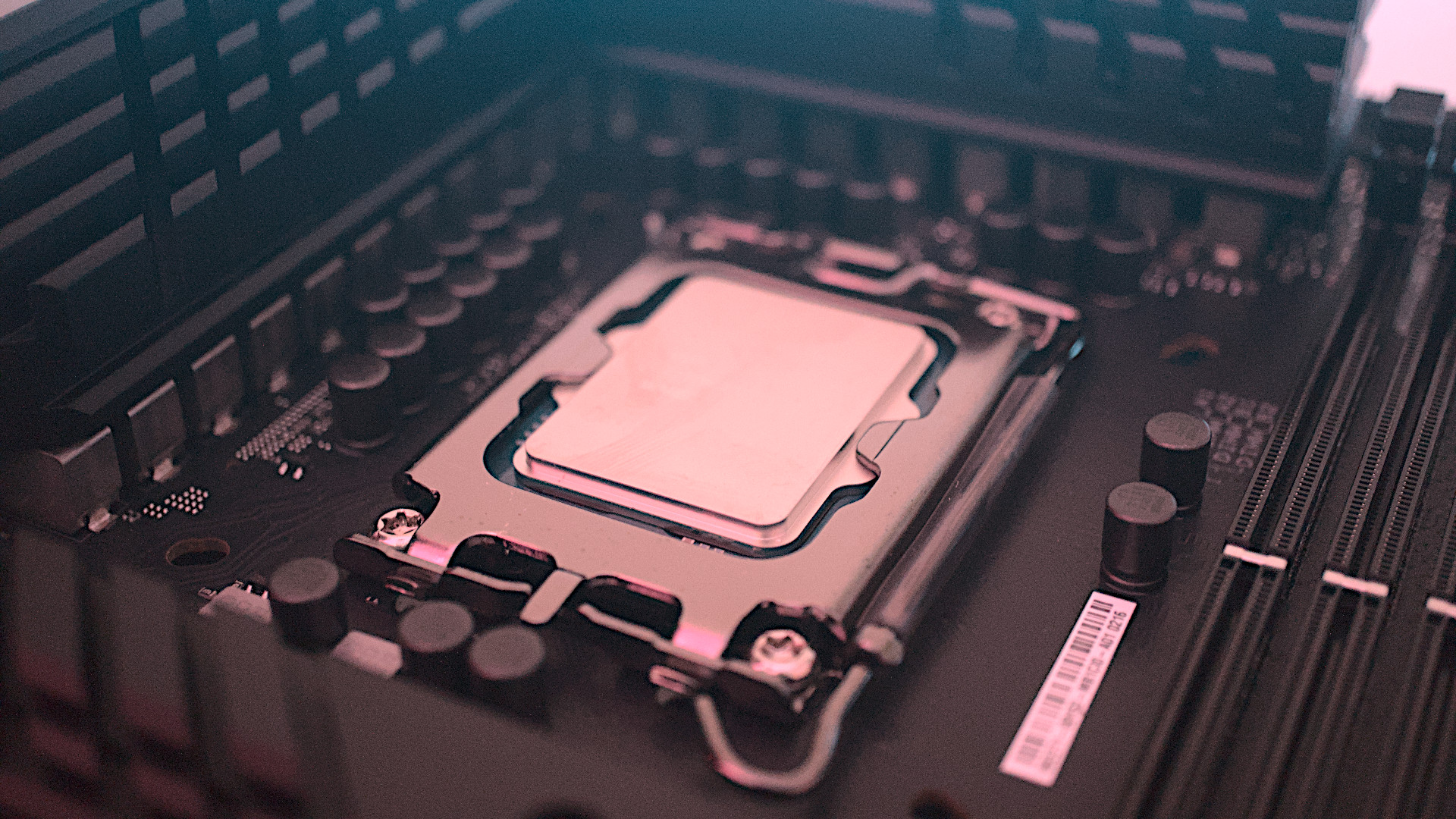
AMD is launching the Ryzen 7 9700X and its entry-level sibling, the Ryzen 5 9600X, at the exact moment that Intel is experiencing an instability crisis with its 13th and 14th Gen Core desktop chips. While a microcode (firmware) patch is rolling out to compatible motherboards, there is still a risk that chips like the i7-13700K could be affected by an oxidization issue if manufactured in early 2023 before Intel had addressed it.
Ryzen 9000 chips weren't immune to launch problems, as AMD delayed the 9600X and 9700X to fix a production issue, which seemed to be little more than a model typo on the chips. Still, enthusiast PC builders who are comfortable updating their motherboard BIOS shouldn't be too wary of comparing the 9700X against its primary rivals, especially as Intel offers extended warranties and RMA assistance.
| CPU | Cores | Threads | Max clock | L3/Smart Cache | Base TDP | MSRP |
|---|---|---|---|---|---|---|
| AMD Ryzen 7 9700X | 8 | 16 | 5.5 GHz | 32 MB | 65 W | $359 |
| Intel Core i7-14700K | 20 | 28 | 5.6 GHz | 33 MB | 125 W | $409 |
| Intel Core i7-13700K | 16 | 24 | 5.4 GHz | 30 MB | 125 W | $409 |
| Intel Core i5-13600K | 14 | 20 | 5.1 GHz | 24 MB | 125 W | $329 |
| Intel Core i5-14600K | 14 | 20 | 5.3 GHz | 24 MB | 125 W | $319 |
Even if the recent microcode bug controversy hadn't happened and Intel was on a level playing field with AMD, there is still the matter of performance-per-watt and the surrounding costs of adopting each processor. Internally, AMD pits the Ryzen 7 9700X against Intel's 14th Gen Core i7-14700K — that's a $359 65W AMD chip with 8 cores and 16 threads against a $409 125W Intel variant with 20 cores and 28 threads.
I can't comfortably recommend Intel's 13th or 14th Gen chips to anyone who isn't extremely comfortable with system tweaks and regular BIOS updates to avoid issues.
Based on performance benchmarking results, the Ryzen 7 9700X is more comparable to a mid-range Intel 13th Gen Core i5-13600K, which launched at $329 but can be found for as low as $249.99 at Best Buy. However, even with a saving of around $100, I can't comfortably recommend Intel's 13th or 14th Gen chips to anyone who isn't extremely comfortable with system tweaks and regular BIOS updates to avoid issues.
Hardcore gamers should wait for the inevitable -X3D variants of the Ryzen 9000 Series unless you're updating from a much older machine. Anyone with an AM5 socket board likely wouldn't see significant boosts in the 9700X from their Ryzen 7000 or even 8000G chips, but those on older AM4 socket boards can target the 9700X for a mid-range upgrade. Intel users on equivalent 12th Gen chips and earlier would need to upgrade their motherboards no matter what, but they should be happy with the 9700X.
Ryzen 7 9700X: Should you buy?
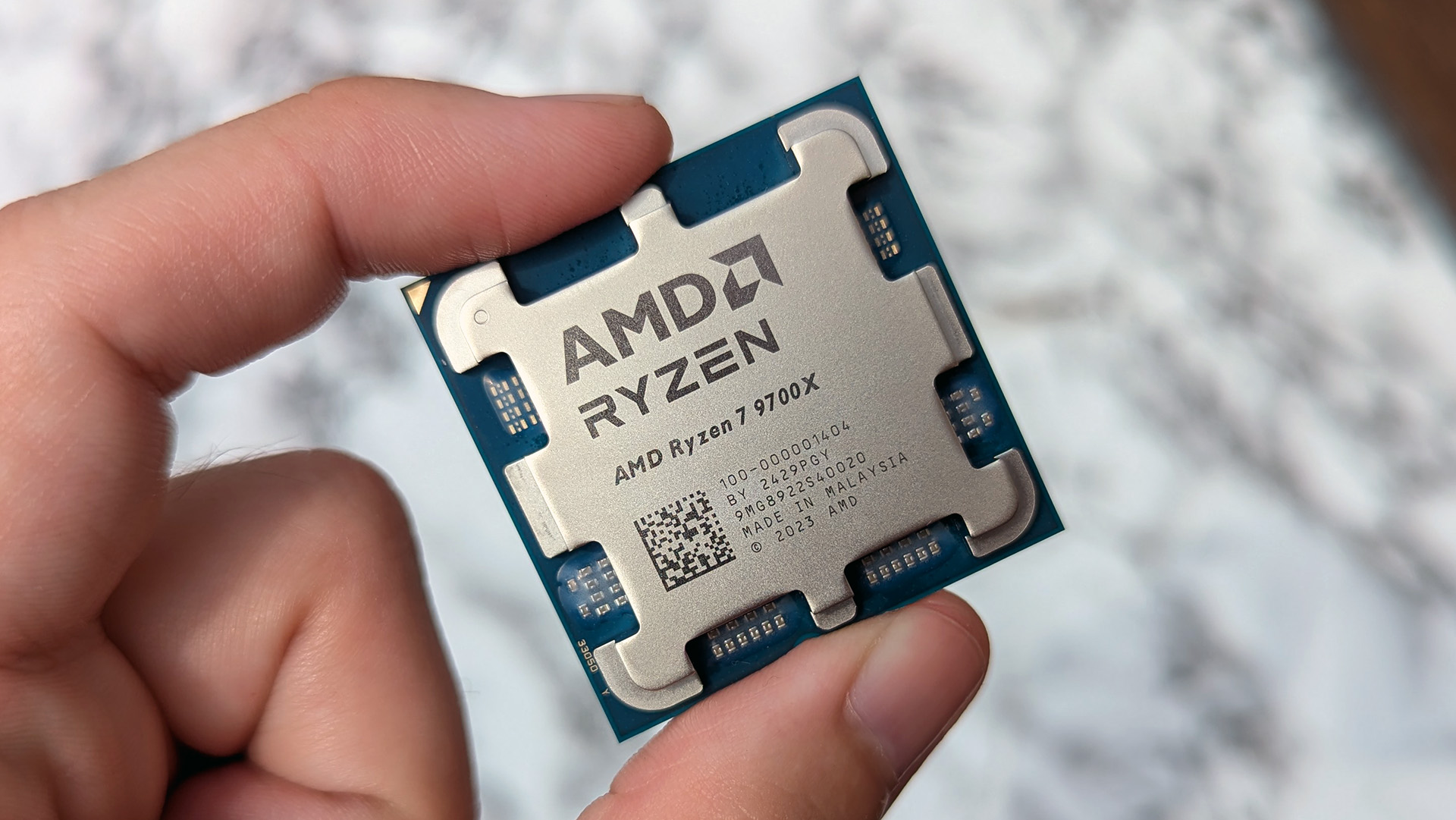
You should buy this if ...
✅ Your apps need strong single-core performance
The Ryzen 7 9700X exhibits some of the best performance in single-core testing that I've ever seen, so it's great for many games and creative apps.
✅ You're building a mid-range gaming PC
Alongside a generous price drop from last gen, the 9700X offers better performance-per-watt over the Ryzen 7000 Series and is a new hot pick over the 5600X.
You should avoid this if ...
❌ You're a hardcore gamer targeting the best specs
AMD will, presumably and inevitably, release -X3D variants of the Ryzen 9000 Series chips, which would make more sense than the 9700X for a high-end gaming rig utilizing AMD's 3D V-Cache.
❌ You already have an equivalent Ryzen 7000 Series chip
While the 9700X has made a generational improvement on multi-core performance (and especially single-core), there isn't enough of a leap over the previous-gen Ryzen 7 7700X.
AMD delivers phenomenal single-core performance in what is otherwise a mid-range processor in its latest Ryzen 9000 Series of desktop chips, with a 'good enough' generational multi-core improvement. Still, a generous price drop from the previous Ryzen 7000 -X chips alongside a return to a 65W base TDP make this an extremely hot pick for mid-tier custom desktop builders looking for the best performance-per-watt, taking over from the Ryzen 5 5600X/7 5800X as my ultimate value-for-money picks.
Intel might be having a rough time with its 13th and 14th Gen chips exhibiting microcode issues, but that doesn't entirely put them out of the race. On the contrary, most comparable Intel Core desktop processors are unaffected or remedied with a simple BIOS update. However, these power-hungry 125W chips are finally knocked off their top spot for single-core scores and can't beat AMD's pricing for this gen. It's an outstanding display from Team Red and scores one of the easiest recommendations I've ever made.

Ben is a Senior Editor at Windows Central, covering everything related to technology hardware and software. He regularly goes hands-on with the latest Windows laptops, components inside custom gaming desktops, and any accessory compatible with PC and Xbox. His lifelong obsession with dismantling gadgets to see how they work led him to pursue a career in tech-centric journalism after a decade of experience in electronics retail and tech support.
